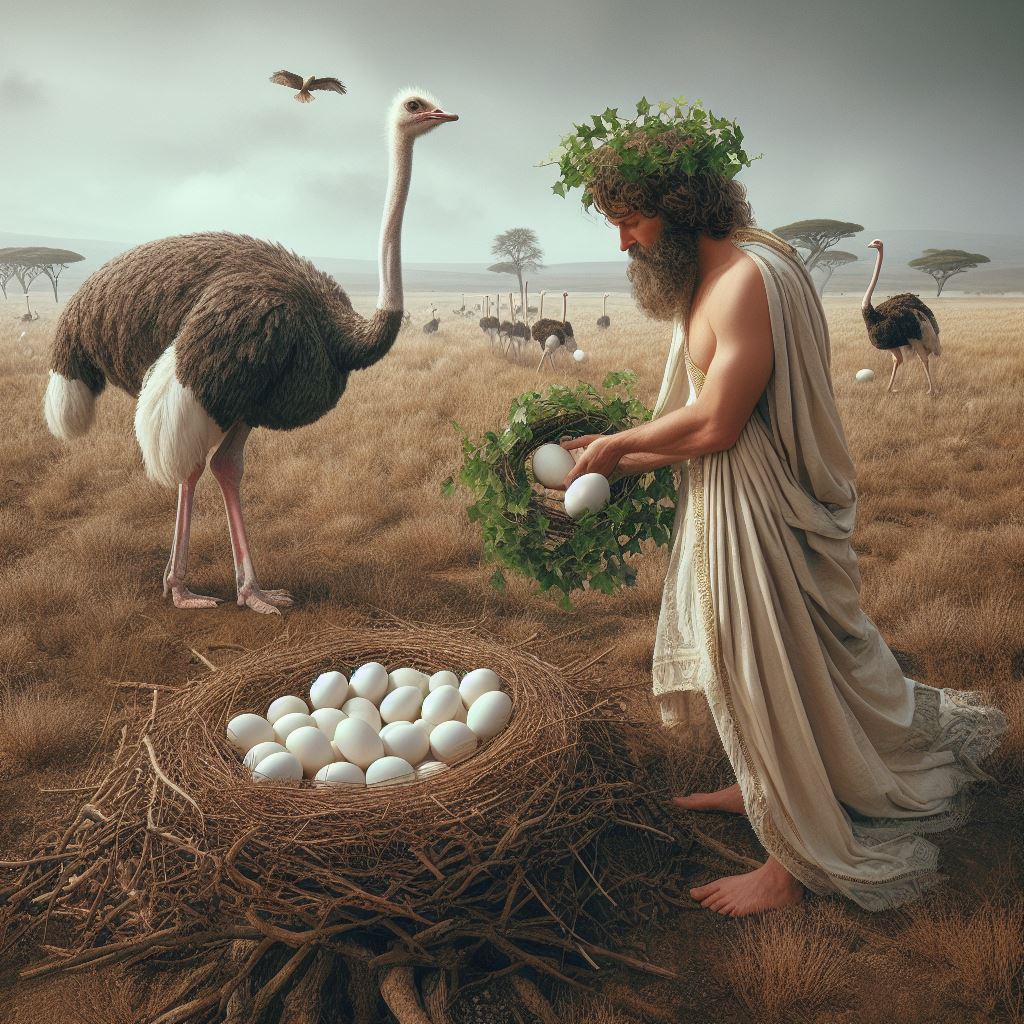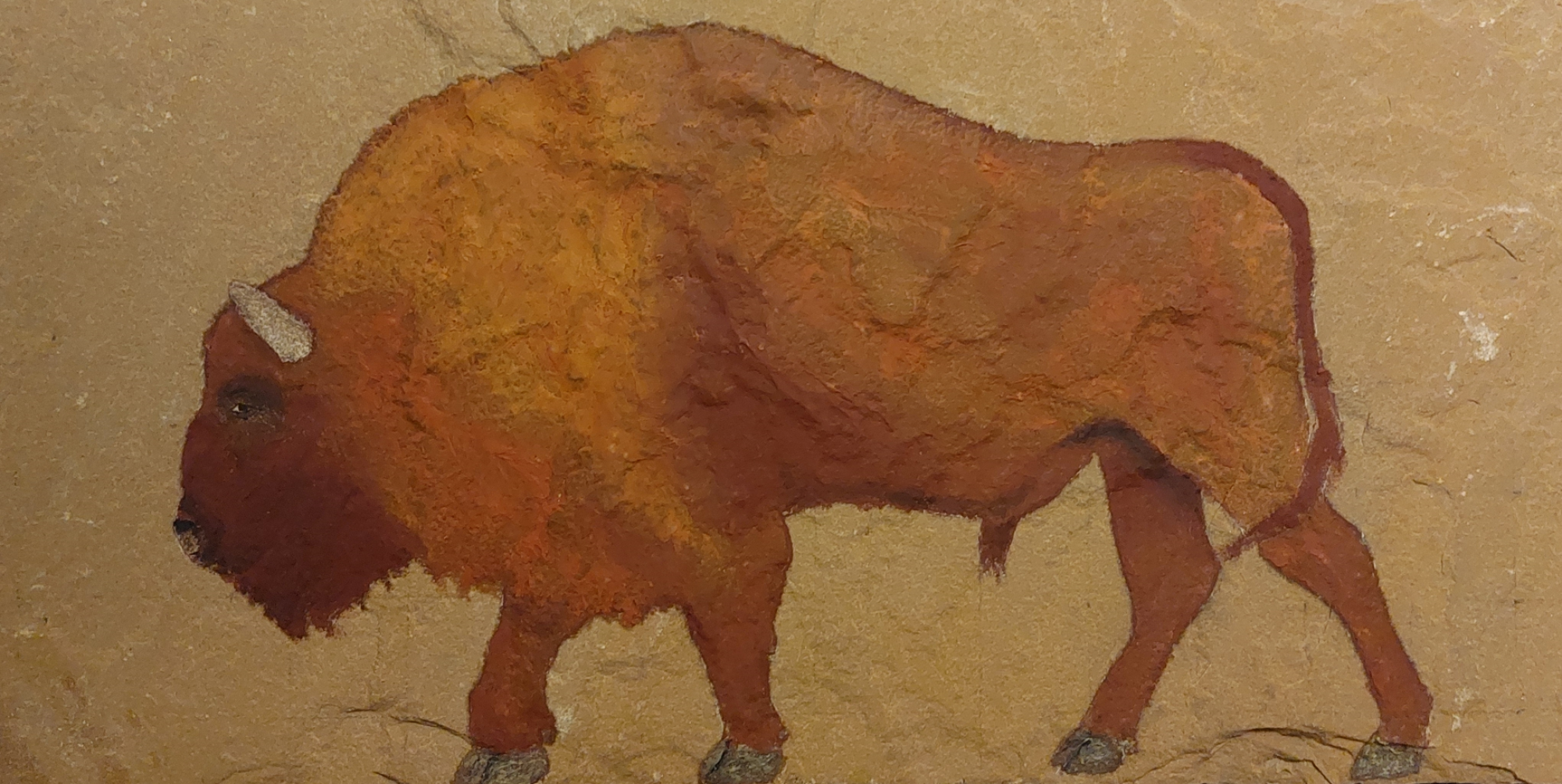My Dearest Callias,
Allow me to regale you with the tale of Batrachios and the Automaton Orator. Batrachios was a man deeply passionate about crafting stories and poems, but who harboured a profound distaste for the resonance of his own voice when narrating his cherished tales.

This peculiar affliction set him on a quest, a journey that stretched from Athens to the far reaches of the Pelasgian world, where he hoped to uncover the secrets of Lion’s powerful voice, which he had heard about in a story he learned from the Arcadian Pelasgians, which began with an account of Ostrich, a creature endowed with the gift of speech in an era when the boundaries between animals and humans were fluid.
In those days, according to this tale, ostriches were akin to people and could articulate their thoughts. One day Dionysos stumbled upon a nest of ostrich eggs during a hunt. The magic bird that guarded the nest granted Dionysos permission to take one small egg from the edge of the clutch. Ignoring this directive, Dionysos seized a number of larger eggs from the center.

To his dismay, as he indulged in the feast, the egg turned into an adhesive substance, sealing his lips shut. Dionysos tried to call his wife, Ariadne, but found himself incapable of speech. His attempts at communication resulted in only a guttural noise emanating from his throat, as his lips remained sealed.
The following day, Dionysos returned the remaining eggs to the nest. The magical bird, sensing his remorse, relented. Dionysos’ mouth was unsealed, and his lips were freed. However, resentment festered within the god, and he cursed the ostrich to lose its speech. Making the punishment fit the crime, he turned Ostrich into a creature who would call to his mate by inflating his throat, while his beak would remain clamped shut.
Despite losing the power of articulate speech, the ostrich retained a vestige of its personhood. But then, during a dance where Lion and Ostrich sang to the delight of the women, Ostrich’s booming voice captured their admiration the most. Jealousy sparked within Lion, leading to a fierce confrontation that saw both creatures lose their remaining humanity, transforming them into animals. Despite their metamorphosis, Lion continued to covet the powerful voice of Ostrich, leading to a relentless pursuit. So the lion hunted the bird, and ate its lungs, and this is how lions first acquired their own loud roars that can be heard at great distance.

Batrachios, sitting amidst the Arcadian Pelasgians, heard this captivating tale, and it was this narrative that kindled the flame of his quest. Fuelled by an insatiable desire to acquire the captivating and resonant voice of the ostrich, he set off for the southern reaches of the Libyan continent, intending to go via Egypt. En route to Egypt, his ship made a stop at the island of Crete, where tales of remarkable automatons forged by Hephaestus for Minos captured his curiosity.

After he had observed these in action, he realised they could be used as orators, and how he could use one of them to read his stories out loud, and one automaton in particular caught his attention because of its rich, resonant voice.

Under the cloak of night, Batrachios stealthily infiltrated the grand palace on Crete. In a clever ploy, he pilfered the clothes of a sleeping old servant woman who toiled in the service of the queen. Batrachios cunningly disguised the dormant automaton as the old woman. As dawn approached, Batrachios, now posing as the old woman’s son, emerged from the palace with the automaton in tow. With a practiced façade of familial concern, he navigated the palace grounds and left undetected.

Now, he no longer needed to continue his quest for the ostrich, but could return on the next ship to Athens.
As Batrachios set sail back to Athens with the pilfered automaton, the sea breeze whispered secrets of his impending destiny. In the heart of the vessel, the disguised automaton sat silent, a dormant repository of potential awaiting its unveiling.
Once back in Athens, Batrachios marveled at the bustling city where the tales of gods and mortals mingled in the air like the fragrance of blooming flowers.

He found a quiet corner, away from the prying eyes of the city’s denizens, to reveal the automaton’s true nature. Stripping away the borrowed garments, Batrachios unveiled the divine creation beneath, a metallic form infused with the ingenuity of Hephaestus.
With a sense of awe and anticipation, Batrachios set about awakening the automaton. As if animated by the breath of Prometheus, the metallic figure stirred to life. Its eyes flickered with an otherworldly glow, and the richness of its resonant voice echoed in the chamber like a melody of the gods.
Batrachios, now accompanied by his newfound companion, contemplated the endless possibilities. He hoped that the automaton’s rich and resonant voice could bring his tales to life in a way that his own voice could not.
In the ensuing weeks, Batrachios marveled at the capabilities of the stolen automaton. The metallic storyteller, though concealed from the public eye, became a trusted companion in Batrachios’s creative endeavors. Not only did the automaton read Batrachios’s tales with a voice that seemed more rich and resonant than his own, but it also proved adept at rewording stories in various styles.
The poet was particularly intrigued when he discovered that the automaton could compose poems on its own. However, as he perused the verses crafted by the metallic storyteller, Batrachios discerned a certain mechanical rigidity, a lack of the nuanced touch that he sought in his own poetic creations. Recognizing the limitations of his metallic muse, Batrachios decided to reserve its assistance for less critical works, returning to the intimate act of personally crafting his most cherished verses.
As the seasons cycled through Athens, bringing the warmth of spring and the languid days of summer, Batrachios honed his craft in tandem with the automaton. The poetic duo seemed to share a silent understanding, a symbiosis of mortal creativity and divine resonance. In the evenings, as the sun dipped below the Athenian horizon, Batrachios would often find solace in the embrace of the city’s ancient streets, the air tinged with the fragrance of blooming laurels and olives.
However, the climax of their journey loomed on the horizon—the Pythian Games in Delphi. These grand festivities, a celebration of both physical prowess and artistic brilliance, drew participants and spectators from across the Greek world. The city of Delphi, perched on the slopes of Mount Parnassus, awaited the convergence of poets, musicians, and athletes.
With his heart brimming with anticipation, Batrachios embarked on the journey to Delphi, the automaton carefully concealed within a lectern. The sacred precincts of Delphi unfolded before them—a tapestry of marble, adorned with intricate carvings and statues that whispered tales of ancient prophecies.

The day of the poetry competition arrived, casting a golden hue upon the sacred landscape. The amphitheater, nestled against the rocky terrain, resonated with the murmurings of gathered spectators. Poets from every corner of Greece, their laurel wreaths signifying both accomplishment and aspiration, prepared to share their verses.
Batrachios, clad in the simple garments of an Athenian poet, took his place among the contenders. As the sun’s rays played upon the golden leaves of the laurel trees, he approached the lectern, the hidden automaton poised to bring his verses to life.
The air, charged with the scent of crushed laurel and the distant melody of a shepherd’s flute, crackled with anticipation. Batrachios, a lone figure against the backdrop of ancient stone, began to mime the words while the automaton, its metallic form hidden within the lectern, stirred to life, and its resonant voice echoed through the amphitheater.

The audience, a mosaic of faces reflecting curiosity and admiration, listened intently. However, a subtle unease pervaded the atmosphere; the automaton’s voice, though captivating, remained unchanged, a steady cadence that did not shift with the ebb and flow of the poem’s emotional currents.
As the final words of Batrachios’s composition lingered in the air, the audience applauded, their appreciation tinged with a hint of perplexity.
As the final echoes of Batrachios’s poem faded into the hallowed air of Delphi, an expectant hush settled over the amphitheater. The audience, still caught in the spell of the automaton’s resonant voice, gazed upon the Athenian poet with a mix of admiration and curiosity.
Unbeknownst to Batrachios, a figure of regal stature sat among the spectators, drawn by the allure of the Pythian Games—the legendary King Minos of Crete. The golden laurels encircling his brow bespoke his royal lineage, and his eyes surveyed the unfolding scene.
As the automaton’s voice lingered in the air, Minos experienced a peculiar sense of déjà vu. His furrowed brow betrayed a silent contemplation, a search within the labyrinth of memory. The familiarity teased the edges of his consciousness, elusive yet undeniable.

Then, like the sudden clarity of a lightning strike, realization dawned upon King Minos. He knew that voice. It belonged to the stolen automaton. Driven by the flames of outrage and justice, King Minos rose from his seat with the regality befitting a monarch. His voice, a thunderous declaration that echoed through the amphitheater, carried the weight of royal authority.
“Thief! Impostor! Fraud!” proclaimed Minos, his words slicing through the ambient murmurs like a herald’s trumpet. The audience, now stirred from their entrancement, turned their attention to the unfolding drama.
In a surge of righteous fury, King Minos ascended the stage of the theatre, his presence commanding the attention of poets and spectators alike. With measured steps, he approached the lectern, where Batrachios stood frozen in the gaze of an unfolding tragedy.

The stolen automaton, concealed within the lectern, became the unwitting protagonist of the unfolding drama. With a forceful motion, Minos unveiled the metallic creation, exposing it to the eyes of the assembled throng. Gasps rippled through the crowd as the divine artistry of Hephaestus was laid bare.
With unyielding resolve, Minos addressed the assembly, his words carrying the weight of accusation and revelation. “Behold, citizens of Delphi! This automaton, a creation of divine ingenuity, was stolen from the grand palace of Crete. The voice that resonates within it is the very voice that once echoed through the halls of my kingdom.”

The revelation hung in the air, a damning indictment that cast a shadow upon the poet who had sought to harness the power of the machine. Batrachios, now bereft of the automaton’s protective guise, stood exposed before the judgment of gods and mortals alike, calling for their mercy and trying to explain himself with his own, weaker voice. The Pythian Games, once a celebration of artistry, now bore witness to a climactic moment of divine retribution and the unraveling of Batrachios’s stolen legacy.
As the words of King Minos echoed through the amphitheater, an air of solemn judgment descended upon Batrachios. The god Dionysos, present in the theatre, observed the unfolding drama with a mixture of amusement and consternation. Though entertained by the narrative woven in the verses, he recognized the breach of divine integrity in the use of the automaton. With a nod to the sacred nature of the Pythian Games, he yielded to the necessity of retribution. In an act that mirrored the mechanical nature of the stolen voice, he decreed Batrachios’s transformation.
In a flourish of divine intervention, Dionysos, compelled by the spirit of justice, turned Batrachios into a creature that mirrored his transgression—an amphibian of the marshlands. The once eloquent poet, now a diminutive green frog, could only express himself through spasmodic monotones, croaks issuing mechanically from his throat like the words of an automaton. “Brekekekekekekekekekekekekek. Brekekekekekekekekekekekekek. Koax. Koax. Koax. Brekekekekekekekekekekekekekrekekekekekekekekekekekekekrekekekekekekekekekekekekek. Koax. ”
Yet, in the intricate tapestry of divine justice, Dionysos infused Batrachios’s frog-voice with a touch of the sublime. The punishment meted out carried a hidden grace, for the god saw merit in Batrachios’s tales and the passion that fuelled the quest. The amphibian’s croaks, once a mechanical monotone, now bore a divine resonance, a key to the portal of perception into the Elysian otherworld.
Batrachios, banished from the mortal realm, found himself in the embrace of Elysium—a haven of divine abundance. Along the flowing waters of the Elysian Fields, where the river murmured secrets to the blessed souls, Batrachios dwelled in shallows and marshes. There he sang his stories day and night.
In this state of bliss, Batrachios, once a seeker of stolen voice, became an eternal singer in Elysium. His croaks, now harmonized with the music of the divine, opened the portal to a realm where fish danced in the crystal-clear waters, ducks and geese traversed the skies in graceful arcs, and fragrant lilies and reeds whispered in the warm winds of Zephyr.

Dionysos, the arbiter of fate, had woven a tale where punishment and honour coalesced. Batrachios, once a mortal thief of voices, now revelled in the celestial chorus of Elysium, a blessed one in the company of souls who found solace in the realm of eternal bliss.

